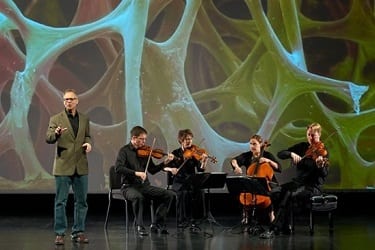Art and Science Merge to Promote Sustainability

Physicist Dr. Robert Davies, founder of the Crossroads Project, combines science with music and art to deliver his message about climate change to UCF students on Feb. 22.
The divergent – yet intertwined – worlds of science and art merged together at UCF in a live evening concert and morning workshops to create public synergism around the challenges of our future, specifically global sustainability and climate change.
By merging intellect with emotion, the “Crossroads Project: Rising Tide,” held in February, inspired others to work together and solve these pressing global problems. “Crossroads” presented a multidisciplinary performance by a physicist, composer, visual artists and a string quartet.
The “Crossroads Project: Rising Tide” was founded by Utah State University physicist Robert Davies, Ph.D., and the Fry Street Quartet, to explore society’s sustainability by marshaling the power of art and science. Dr. Davies stood on stage in the Visual Arts Building, and discussed humanity’s impact on the natural world.
Dr. Davies expressed that he wanted “Crossroads” to be something more than just another scientific lecture that boggles the mind, and so he deliberately structured the performance and lecture to reach audiences on an emotional and personal level.
The “Crossroads Project: Rising Tide” was brought to UCF through the combined efforts of Claudia Schippert, Ph.D., interim director of the Office of Interdisciplinary Studies and Stephen Fiore,Ph.D., Director of the Cognitive Sciences Laboratory.
The environmental experts have been traveling the country to promote awareness and understanding of interdisciplinary thinking and environmental action, and UCF is fortunate to have them work with our students and faculty, said Dr. Schippert.
Dr. Fiore first saw the “Crossroads Project” perform at the 100th anniversary conference of the Ecological Society of America and he said he was amazed at the seamless blend of ideas by the group.
“I was so impressed by the power of the performance, I knew I wanted to bring them down to UCF given our own research on environmental sustainability, as well as UCF’s efforts in combining art and science,” he said.
Earlier that day, the “Crossroads” performers worked with the Office of Interdisciplinary Studies and participated in two workshops. The first was aimed at students to help them understand sustainability and activism in support of the environment. The other was for faculty and designed to help them understand interdisciplinary approaches to teaching about environmental sustainability.
Click here to watch WUCF’s SciTech episode on the “Crossroads Project: Rising Tide.”
